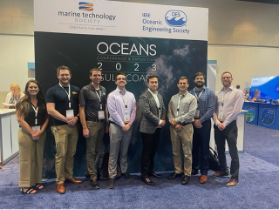Meet Your Board: Paige George

Meet Your Board is a regular series spotlighting each member of the FLC’s Executive Board, the governing body responsible for carrying out the organization’s mandated mission to promote, educate and facilitate federal technology transfer.
1. What has drawn you to a career in federal technology transfer?
Federal technology transfer has drawn my interest since I worked under my first CRADA and attended my first FLC National Meeting in 2015. As an engineer for the Department of the Navy, I saw firsthand how collaborating with academia and industry enables the delivery of critical technologies to our sailors much faster and at a much lower cost to taxpayers than standard acquisition.
My mentors in this arena played a pivotal role in encouraging me to pursue this field. FLC Award winner and heads-up display technology expert Dennis Gallagher and past FLC Chair and Harold Metcalf Award winner Ed Linsenmeyer both supported my interest in this unique field. Being a T2 manager allows me to invest time in all of my interests and have the opportunity to work with scientists and engineers, IP attorneys, laboratory leadership, as well as industry and academic partners. T2 is all about connection, innovation and collaboration. The people are truly what makes this field so amazing!
2. What motivates you to volunteer your time to serve on the Board?
My motivation to serve on the FLC Board comes from the people. Having access to so many experts in the field from all of the federal agencies has enriched my career in more ways than I can count. The diversity of backgrounds that the board members bring to the table creates a collaborative environment unlike any I have ever been a part of. The FLC fulfills a significant mission for the United States, and it is an honor to be in a role that influences the most effective strategies we use to accomplish that mission.
3. What strength or skill do you bring to your position on the Board?
My background as an engineer and as someone who has used T2 mechanisms to support Navy projects has been beneficial in the T2 world. Having this experience within the DoD provides a valuable perspective to the Board when it comes to the development of strategies that we can use to facilitate technology transfer opportunities for our member labs. The FLC has a history that spans almost 45 years and having an appreciation and a working knowledge of that history is also an important aspect of being on the Board. It is difficult to decide where you are going if you don’t know where you have been!
4. As you and the Board guide the FLC’s future direction, what do you anticipate will have the most significant impact on the landscape of federal tech transfer in the coming years?
ACCESS! While going through a global pandemic is something I would be happy to never experience again, there is a silver lining. The increase in virtual communication has opened the door to so many different access points that we didn’t have before. Nothing can truly replace in-person connection, but the development of new virtual meeting capabilities has allowed the FLC to quickly develop and roll out programs that have significantly increased engagement with the FLC. This engagement has not only come from our member federal labs, but also with innovators, entrepreneurs, industry and academia. As these collaborative technologies continue to evolve and improve, the access that people have to the FLC will create a direct conduit to the federal labs. I foresee a continual increase in engagements, partnerships and opportunities for those interested in accessing the resources of the federal laboratories.
5. What is one little-known fact about yourself?
It shouldn’t be a surprise that anyone working in the field of T2 would have multiple interests or expertise in a variety of fields. It’s one of the hallmarks of working in technology transfer. My background is in mechanical engineering, and I worked in diving and life support systems for over a decade. I also have a master's degree in STEM leadership. These degrees seem unrelated, but I have the unique opportunity to collide my favorite subjects: science and education! I am an adjunct professor at Florida State University in the Elementary Education department teaching science to future educators. It has been a dream come true, as we can all agree that science education is critical to the health and safety of our nation. Teachers are superheroes and it is such a privilege to be a stepping stone on their journey toward preparing students for the future.

OCEANS 2023 – FLC had a booth

CRADA Signing ceremony between NSWC PCD and Brown University

CRADA Signing ceremony between NSWC PCD and Sagetech Avionics